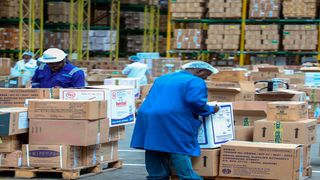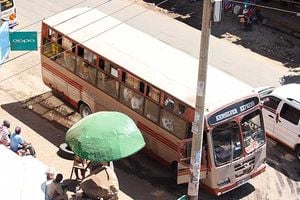
Workers at the Kenya Medical Supplies Authority, Embakasi depot, in Nairobi on Thursday. The government agency is in the middle of yet another procurement scandal.
| Dennis Onsongo | Nation Media GroupNews
Premium
Powerful individuals behind new billion shilling scandals
Lamentations by Health Cabinet Secretary Susan Nakhumicha and reports of meddling in investigations into the sugar scandal have raised questions about powerful figures pulling the strings behind the scenes.
Ms Nakhumicha’s public display of frustration with an official at the scandal-ridden Kenya Medical Supplies Authority (Kemsa) following an investigation into the Sh3.7 billion procurement of mosquito nets was surprising, considering the state agency is under her ministry.
Even before the dust had settled on the Kemsa scandal, over which the minister said suspended Kemsa boss Terry Ramadhani snubbed an emissary sent to review procurement, the sugar scam erupted, sucking in a Cabinet Secretary and other influential individuals.
The CS reportedly exposed the shady deal, disgruntled with being shortchanged on kickbacks by a senior official following the release of the condemned consignment to a trader who subsequently flooded the market.
Also Read: Kemsa paid firms Sh870m in a rush
The Sunday Nation has learnt of a power struggle to frustrate the investigation ordered by President William Ruto on the release of the 20,000-50kg bags of the condemned sweetener.
Sources privy to the investigations say the meddling has several motives: to stall the investigations, get some of the suspects off the hook or turn them into prosecution witnesses as part of a cover-up.
Insiders aware of the investigations revealed that powerful individuals are making calls to detectives with a view of protecting some of those implicated in the dirty sugar shame.
“It is strange that the officers are receiving calls on how to investigate the matter, even after the President committed to keep off the business of state agencies. There are those seeking to forestall the investigation,” said an officer.
The investigator requested to speak to the Sunday Nation in confidence.
According to sources, attempts to take the suspects to court have been delayed twice despite the file being forwarded to the Director of Public Prosecutions by the Directorate of Criminal Investigations (DCI).
The suspects, arrested weeks ago before President Ruto cracked the whip, were to be arraigned on Wednesday.
They again did not appear in court on Friday, but according to security sources, they will be arraigned on Tuesday.
Some of those quizzed by DCI detectives have been given Sh100,000 bond.
Also Read: Inside Ruto's Kemsa purge
Influential individuals in the government are pushing to have some of the suspects turned into state witnesses in the criminal case.
“The President has ordered thorough investigations to ensure the suspects are held to account. Some officers are receiving calls from different quarters. The callers want the suspects, who they claim to be innocent, turned into witnesses,” said a source in government familiar with the matter.
The toxic sugar was released to the market through collusion by two government officials and two politicians from Mt Kenya, with the aid of bureaucrats in some state agencies.
Twenty seven officers from a dozen institutions thought to have aided the release of the bad sugar were suspended from duty on Thursday, with some expected to appear in court soon.
Sources say the delay in taking the officials to court could be as a result of a push-and-pull involving senior government officials, with one side trying to protect suspects.
The twists and turns in the poisoned sugar scandal give credence to Ms Nakhumicha’s frustrations.
She lamented that Kemsa officials blocked her efforts to have the mosquito net scandal investigated and made public.
The minister’s admission was interpreted by some to mean that a number of her juniors may have been taking instructions from other quarters, perhaps more powerful than her office.
Ms Nakhumicha accused suspended top Kemsa officials of frustrating her efforts to clean the agency.
Ordinarily, a senior officer of a state organisation would be directly responsible to the line minister, unless he or she enjoys protection from other quarters.
It also emerged that her initial efforts to bring in the Ethics and Anti-Corruption Commission (EACC) to investigate the Sh3.7 billion tender for the supply of treated mosquito nets was frustrated by unnamed people.
“Just to let you know how corruption fights back. On Thursday last week immediately after the release of the report, I wrote to the EACC asking it to investigate,” the CS said.
“On Monday morning, I reached out to (EACC Chief Executive Officer) Twalib (Mbarak) to find out if he had received my letter. To my surprise, he had not. But he assured me that his detectives had swung into action.”
Also Read: Mosquito nets deal bites PS, Kemsa bosses
She added that there are people in Kenya who want to enrich themselves “on the backs of patients’ money”.
“This is very shameful. Very shameful and I will not allow it,” the Health Cabinet Secretary told journalists.
President Ruto on Tuesday dismissed Public Health Principal Secretary Josephine Mburu and suspended Ms Ramadhani in response to the revelation that Kemsa bungled the Sh3.7 billion mosquito nets tender.
The President also kicked out the agency’s entire board.
President Ruto vowed to lead the war on corruption, declaring that there are no sacred cows in his administration.
“I will take personal responsibility for the accountability of this country’s resources. No one will be allowed to steal public resources. Dare and you will encounter me,” the President said.
“I have told everyone...my friends and those who are not my friends, that corrupting public resources is a no-go zone. I will be speaking less on this, but action will declare my intentions louder.”
In the sugar saga, a document, authored by Kenya Bureau of Standards Director of Quality Assurance, Geoffrey Muriira and approved by Mr Bernard Njiraini on behalf of the National Standard Council that recommended the release of the sugar for conversion into ethanol said there was no risk to humans or animals.
“The proposed ethanol is only for industrial use,” it said.
The letter opened opportunities for corrupt individuals, with details emerging how a government official shortchanged a Cabinet minister and two lawmakers.
It is the subsequent fallout among the politicians that blew cover on the scandal.
The condemned sugar was reportedly sold to a distributor operating a store in Eastleigh estate, Nairobi.
A driver hired by the trader to take the toxic consignment from the godown in Thika was intercepted by DCI officers.
The driver later led detectives to the distributor at 14th street in Eastleigh Section Three.
The distributor deals in sugar, flour, rice, cooking oil among other consumables.
He was arrested alongside two others who work as managers at the store.
It is not the first time forces in President Ruto’s administration are pulling the rag under his feet.
During the East African Legislative Assembly (EALA) vote, some forces in the ruling Kenya Kwanza alliance joined hands to defeat a list of nominees that had been approved at State House.
The individuals opposed to the list are reported to have held a secret meeting hours after the one by the President and plotted to overturn his decision.
According to credible reports, during the election in November last year, a high-level meeting of those who were disgruntled with the State House line-up took place in the evening when the lawmakers in attendance resolved to vote for their favourite candidates.
Some MPs in the Kenya Kwanza camp had said it was wrong for the President to openly endorse the five, adding that the move led to discomfort in the coalition.
By the end of the voting, those chosen were Mr Hassan Omar, Ms Zipporah Kering, Mr David Sankok, Mr Mwangi Maina and Mr Cyprian Kubai Iringo.
In the war on corruption, the President has made a move to checkmate individuals thought to be behind the two scandals but they appear to be fighting back.






